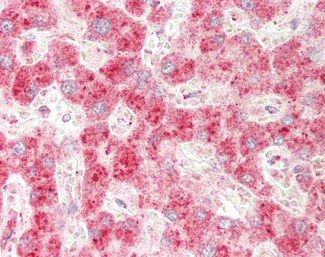USP25 Antibody (Internal)
Rabbit Polyclonal Antibody
- SPECIFICATION
- CITATIONS
- PROTOCOLS
- BACKGROUND

Application
| WB, IHC-P, IF, E |
|---|---|
| Primary Accession | Q9UHP3 |
| Other Accession | 29761 |
| Reactivity | Human, Mouse |
| Host | Rabbit |
| Clonality | Polyclonal |
| Calculated MW | 122218 Da |
| Dilution | IF (20 µg/ml), IHC-P (10 µg/ml), WB (1 - 2 µg/ml), |
| Gene ID | 29761 |
|---|---|
| Other Names | USP25, Deubiquitinating enzyme 25, Ubiquitin thiolesterase 25, Ubiquitin thioesterase 25, USP on chromosome 21, Ubiquitin specific protease 25 |
| Target/Specificity | USP25 antibody is human and mouse reactive. Multiple isoforms of USP25 are known to exist. |
| Reconstitution & Storage | PBS, 0.02% sodium azide. Long term: -20°C; Short term: +4°C. Avoid repeat freeze-thaw cycles. |
| Precautions | USP25 Antibody (Internal) is for research use only and not for use in diagnostic or therapeutic procedures. |
| Name | USP25 |
|---|---|
| Synonyms | USP21 |
| Function | Deubiquitinating enzyme that hydrolyzes ubiquitin moieties conjugated to substrates and thus, functions in various biological processes including inflammation, immune response (PubMed:29518389, PubMed:37683630). Modulates the Wnt/beta-catenin pathway by deubiquitinating and stabilizing tankyrases TNKS1 and TNKS2 (PubMed:28619731, PubMed:30926243). Regulates KEAP1-NRF2 axis in the defense against oxidative assaults by deubiquitinating KEAP1 and protecting it from degradation leading to degradation of the NRF2 transcription factor that is responsible for mounting an anti-oxidation gene expression program (PubMed:37339955). Positively regulates RNA virus-induced innate signaling by interacting with and deubiquitinating ERLIN1 and ERLIN2 (PubMed:37683630). In turn, restricts virus production by regulating cholesterol biosynthetic flux (PubMed:37683630). Acts as a negative regulator of interleukin-17- mediated signaling and inflammation through the removal of 'Lys-63'- linked ubiquitination of TRAF5 and TRAF6 (PubMed:23042150). Prevents the ubiquitination and degradation of TRAF3 to reduce the phosphorylation levels of JNK and P38, the secretion of IL-1B and to induce endotoxin tolerance (PubMed:30579117). |
| Cellular Location | Cytoplasm |
| Tissue Location | Isoform USP25a is found in most adult and fetal tissues; expression is moderately high in testis, pancreas, kidney, skeletal muscle, liver, lung, placenta, brain, heart, but very low in peripheral blood, colon, small intestine, ovary, prostate, thymus and spleen. Isoform USP25b is found in all tissues except heart and skeletal muscle. Isoform USP25m is heart and skeletal muscle specific |

Thousands of laboratories across the world have published research that depended on the performance of antibodies from Abcepta to advance their research. Check out links to articles that cite our products in major peer-reviewed journals, organized by research category.
info@abcepta.com, and receive a free "I Love Antibodies" mug.
Provided below are standard protocols that you may find useful for product applications.
Background
Deubiquitinating enzyme that hydrolyzes ubiquitin moieties conjugated to substrates and thus, functions to process newly synthesized Ubiquitin, to recycle ubiquitin molecules or to edit polyubiquitin chains and prevents proteasomal degradation of substrates. Hydrolyzes both 'Lys-48'- and 'Lys-63'-linked tetraubiquitin chains.
References
Valero R.,et al.Genomics 62:395-405(1999).
Groet J.,et al.Genes Chromosomes Cancer 27:153-161(2000).
Valero R.,et al.Submitted (FEB-2009) to the EMBL/GenBank/DDBJ databases.
Mural R.J.,et al.Submitted (SEP-2005) to the EMBL/GenBank/DDBJ databases.
Ota T.,et al.Nat. Genet. 36:40-45(2004).
If you have used an Abcepta product and would like to share how it has performed, please click on the "Submit Review" button and provide the requested information. Our staff will examine and post your review and contact you if needed.
If you have any additional inquiries please email technical services at tech@abcepta.com.













 Foundational characteristics of cancer include proliferation, angiogenesis, migration, evasion of apoptosis, and cellular immortality. Find key markers for these cellular processes and antibodies to detect them.
Foundational characteristics of cancer include proliferation, angiogenesis, migration, evasion of apoptosis, and cellular immortality. Find key markers for these cellular processes and antibodies to detect them. The SUMOplot™ Analysis Program predicts and scores sumoylation sites in your protein. SUMOylation is a post-translational modification involved in various cellular processes, such as nuclear-cytosolic transport, transcriptional regulation, apoptosis, protein stability, response to stress, and progression through the cell cycle.
The SUMOplot™ Analysis Program predicts and scores sumoylation sites in your protein. SUMOylation is a post-translational modification involved in various cellular processes, such as nuclear-cytosolic transport, transcriptional regulation, apoptosis, protein stability, response to stress, and progression through the cell cycle. The Autophagy Receptor Motif Plotter predicts and scores autophagy receptor binding sites in your protein. Identifying proteins connected to this pathway is critical to understanding the role of autophagy in physiological as well as pathological processes such as development, differentiation, neurodegenerative diseases, stress, infection, and cancer.
The Autophagy Receptor Motif Plotter predicts and scores autophagy receptor binding sites in your protein. Identifying proteins connected to this pathway is critical to understanding the role of autophagy in physiological as well as pathological processes such as development, differentiation, neurodegenerative diseases, stress, infection, and cancer.


